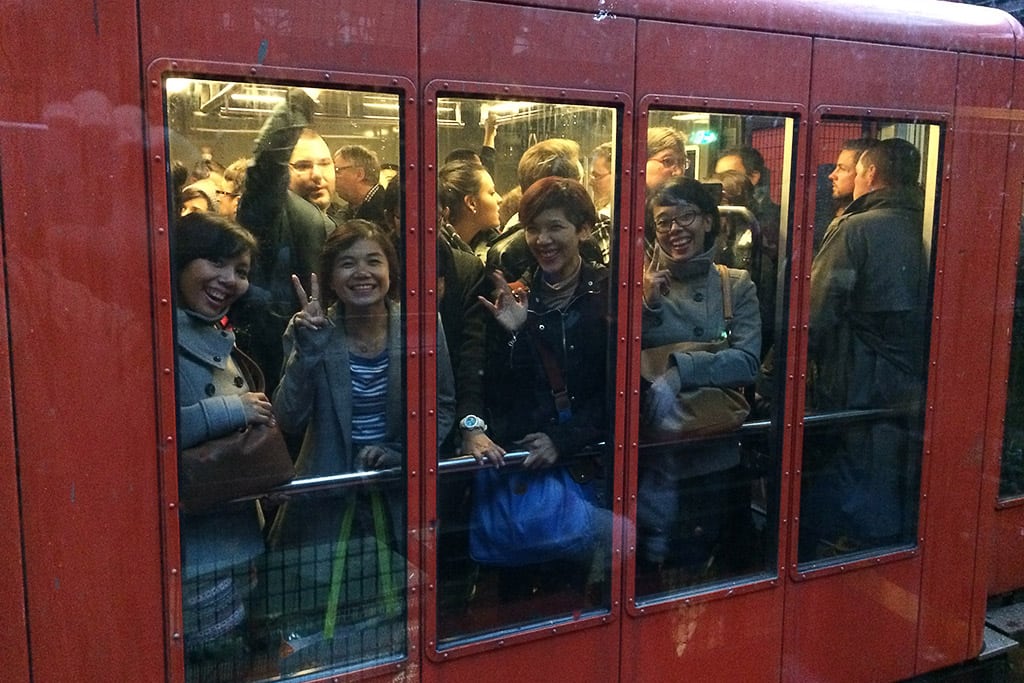Skift Take
Marketing the benefits of "living like a local" avoids the reality that most visitors live like a tourist — and that's not a bad thing.
I want so badly to like the Airbnb ad campaign “Don’t go there.”
I want to in part because I have tremendous respect for the Airbnb organization, for the people who work there (like Chip Conley, and Jonathan Mildenhall), and for the work that TBWA\Chiat\Day does. But for all that I think the campaign largely succeeds in its efforts to create a community of a certain type of traveler (who, let’s face it, are basically just more affluent hostelers), and for all that I’m sure various ad metrics will prove its successitude, it fails for me for one big reason – it leaves out an enormous segment of the population.
Maybe that’s the point, but for a brand that kind of seems to claim inclusivity as a brand value, the fact that they are actively dismissing and eschewing – and yes, excluding – such a big group seems to create pretty serious dissonance.
Who’s the big group that’s being excluded? Watch the commercials again. It’s people who take selfies at the Eiffel Tower, who tour the Seine by boat, who ride Segways past the Arc d’Triomphe. People whose very presence in the ads is so disregarded that they’re only seen under cold gray rainy skies, people who, in both words and tone, are referenced almost contemptuously in the voiceover. Ironically and stereotypically, it’s as if the ad was penned by a French writer sitting at a café off the Champs Elysees looking down his Gauloise at the group of American (or German, or Australian) tourists doing any of those things noted above with the sneer that has become (unfortunately) commonplace for tourists to see in that city.
The big group that’s being excluded is also people who travel from certain parts of the world to see other parts of the world. People who spend their hard-earned money to do so. People who, yes, sometimes stay in hotels precisely because it’s NOT like being at home. Because sometimes they don’t want to do the stuff they normally do – they’re on vacation trying to do stuff that they never do, or have never done before.
But they’re also people who, maybe, could be convinced to stay in someone else’s house or apartment or yurt if they felt welcomed. If they felt like it was for them. If they felt that they weren’t going to be judged for wanting to see the Statue of Liberty when they visited New York, or to ride a cable car when they visited San Francisco, or to experience the never-before-seen at Boston’s Museum of Fine Arts.
http://youtu.be/1AtjOKph7-k
Because you know what? Not only is there nothing inherently bad about those experiences, I’d argue (and many millions who visit them every year would agree) that in fact those experiences are pretty damn awesome. In particular if you’ve read about them in books since you were a kid, or seen them in movies for years, and saved all your money up to take your family on a once-in-a-lifetime trip to experience them. If you do that, man oh man, those experiences are fantastic.
Interestingly, and speaking of dissonance, if you check out Airbnb’s website, there’s a pretty significant and marked difference between how the brand speaks in its commercials versus how their hosts speak about their properties and about how the guests speak about their experiences. Just as an example, check out some properties in downtown Atlanta, and see how many hosts talk about their proximity to Pemberton Place (home to the incredible Georgia Aquarium, the World of Coca-Cola, and the new Center for Civil & Human Rights) – note that they talk about the proximity as a good thing, as in “Easily walkable to several of the city’s best attractions.” Then check out the guests’ comments – they too speak about how great it was that the attractions they most wanted to see were so accessible.
Still not sure? Check out Houston, or Dallas, or Seattle, or Chicago. You’ll find the same thing, I guarantee it (I guarantee it because I’ve already checked – I have a Romney-esque “binder full of comments” on the subject). In every case and every city, hosts and guests loudly proclaim as one of the key benefits that they’re very close to the city’s best attractions, whether that’s Space Center Houston, the Perot Museum of Nature & Science, the Space Needle, or the Shedd Aquarium. So why is it that Airbnb makes it sound like such a bad thing that people want to see some of these (admittedly) mainstream attractions? News flash: things are popular when more people like them.
Look, I’m not saying that the campaign is bad, in fact I think the work is beautiful. I just think it’s limiting, and I think many people in the visitor industry are willing to just “go with the trend” rather than do the work to see where the real opportunity is. I think there’s a bigger world out there than just those people who want to live like locals, and there’s more need than ever in the world to be inclusive vs. exclusive, so I hate to see a smart brand like Airbnb miss out on opportunities to introduce more people to its amazing products and hosts.
Hey, it’s great to live like a local, but I think in many cases people also want to visit like visitors.
Matt Stiker is the Chief Marketing Officer & SVP of Sales at CityPASS
The Daily Newsletter
Our daily coverage of the global travel industry. Written by editors and analysts from across Skift’s brands.
Have a confidential tip for Skift? Get in touch
Tags: airbnb
Photo credit: Tourists at the Eiffel Tower in Paris. Campaigns encouraging visitors to "live like a local" forget that they have different priorities than locals. Skift
